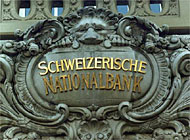
Banks react to new global risks

Banks in Switzerland and across Europe are taking precautionary steps as they come to terms with how last week's terrorist attacks in the United States, which destroyed the World Trade Center, may affect their business.
The banks have been taking stock in view of heightened global risks, and an increased concern over the possibility of recession.
The central bank in Zurich lowered the target range for the three-month London InterBank Offering Rate (Libor) to 2.25-3.25 per cent, in line with interest rate cuts in the United States and elsewhere in Europe.
The bank made the decision on Monday “to counter any insecurity in the financial markets” after last week’s terror attacks in the United States. The evaluation had earlier been scheduled for Thursday.
A US recession or a sustained depreciation of the dollar could have a deflationary impact on Europe and Switzerland, the bank added.
The Swiss National Bank says global risks have increased markedly, causing growing uncertainty about the possible effects on the Swiss economy. However, it expects the economy in the United States and Europe to pick up in the first half of 2002.
European bank cuts rates
The European Central Bank cut euro zone interest rates, and the Federal Reserve and Bank of Canada have also lowered borrowing costs.
The Bank of Japan cut its official discount rate to 0.10 per cent from 0.25 per cent to make funds available in the market. The discount rate is the rate the central bank charges financial institutions for loans. The Bank of England was also expected to follow suit.
In Switzerland, the central bank said the new interest level would ensure price stability and allow for balanced economic growth.
The Swiss economy expanded by two per cent in the second quarter, compared with the same period last year, the bank said.
It blamed slackening growth on investment and exports, saying consumption had risen “significantly”. The pace of economic growth could slow further in the third and fourth quarters in the wake of stagnating exports, the bank said.
Overall, however, the Swiss economy is expected to recover over the next year, the bank said. The labour market was not likely to have long-term changes, and the unemployment rate should rise only slightly.
The annual inflation rate in Switzerland, as measured by the national consumer price index, climbed from one per cent in the first quarter of the year to 1.5 per cent in the second quarter. Annual inflation dropped to 1.1 per cent in August from the 1.4 per cent recorded in July.
swissinfo with agencies

In compliance with the JTI standards
More: SWI swissinfo.ch certified by the Journalism Trust Initiative






























You can find an overview of ongoing debates with our journalists here . Please join us!
If you want to start a conversation about a topic raised in this article or want to report factual errors, email us at english@swissinfo.ch.